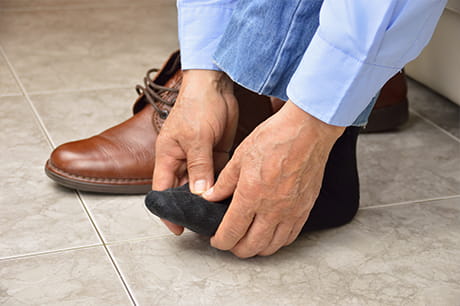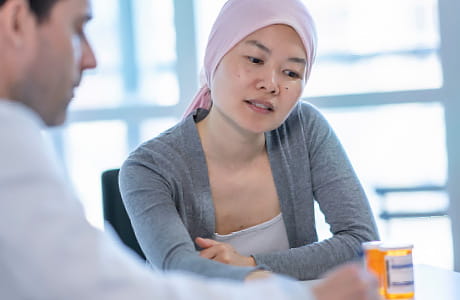Can chemotherapy make my feet tingle?
If you were told you needed chemotherapy, hair loss was probably the side effect that came to mind. But tingling or numbness in the hands and feet? Those are also possible side effects of chemotherapy, according to Geisinger podiatrist Dr. Elaine Rowling.
“These sensations or loss of feeling are known as peripheral neuropathy,” she explains. “Chemotherapy drugs and other treatments for cancer can cause damage to the nerves that control the sensations and movements of your arms, legs, hands and feet. It’s something we call chemotherapy-induced peripheral neuropathy.”
How long do symptoms last?
Often, the neuropathy goes away soon after your chemotherapy treatments are complete. But in some cases, the symptoms continue. Luckily, there are treatments to relieve the pain and unusual sensations associated with chemotherapy-induced peripheral neuropathy. Your doctor may prescribe steroids for short-term use. You can apply patches or creams that contain numbing medicine directly to the painful area. Antidepressants and anti-seizure medications are also options.
“People react differently to medications. It may take more than one attempt to find the approach that works best for you,” says Geisinger oncologist Dr. Shreya Sinha. “We might also recommend treatments like relaxation therapy, guided imagery, electric nerve stimulation, occupational and physical therapy, and even acupuncture, which require no medication at all and have been shown to ease nerve pain brought on by a variety of conditions.”
Staying safe is important
If you’re having chemotherapy-induced peripheral neuropathy, it’s important to take precautions to avoid injury. Always wear shoes that cover your whole foot, even at home. If you have problems with stumbling, consider installing handrails in hallways and bathrooms to help you keep your balance and think about using a walker or cane for extra support.
“Be sure to protect your hands and feet from extreme temperatures,” says Dr. Rowling. “Set hot water heaters in your house between 105°F and 102°F to reduce scalding risk and check your bath water with a thermometer.” She also recommends examining your feet often to make sure you do not have any injuries or open sores. “If open sores develop, call your doctor right away,” she says.
Good nutrition is always important. But when you’re undergoing treatment for cancer, eating well gives your body the strength it needs and might also minimize some treatment-related side effects. Avoid alcohol if you’re having any symptoms related to chemotherapy-induced peripheral neuropathy, as it can make them much worse.
“Mild symptoms usually resolve fairly quickly,” Dr. Sinha says. “But more severe cases can linger for months or years — or even become permanent. That’s why it’s so important to contact your oncologist if you start experiencing side effects. They may choose to prescribe lower doses of chemotherapy drugs over a longer period or stop chemotherapy altogether until your symptoms improve. Effective treatment with minimal side effects is always my goal.”
Next steps:
Discover the health benefits of meditation
How to plant more fruit and veggies in your diet
Learn about physical changes after cancer treatment





